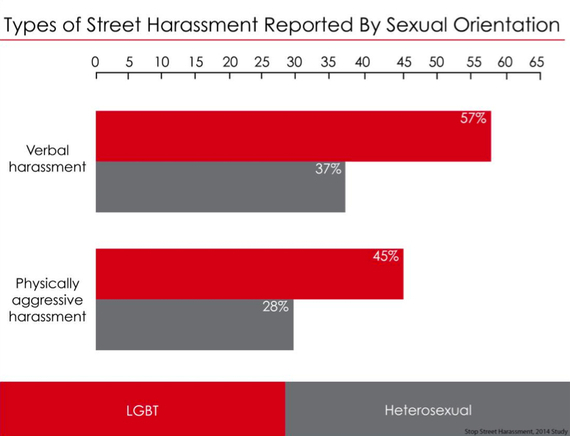During a talk called "All The Little Things" posted on the TEDx Talks YouTube channel last week, Irish drag queen Panti Bliss - appearing before a crowd in Dublin last September - explained why an act like holding your partner's hand isn't so thoughtless for everyone.
"I am 45 years old and I have never once unselfconsciously held hands with a lover in public," Bliss says. "I am 45 years old and I have never once casually, comfortably, carelessly held hands with a partner in public."
Why? Because around the world still today, street harassment is a major problem for women, LGBT people, people of color, people with disabilities, and low-income people. Bliss' focus is on homophobia, as was her similarly personal and impassioned speech about a year ago when she asked, "Have you ever been standing at a pedestrian crossing when a car drives by and in it are a bunch of lads, and they lean out the window and they shout "fag!" and throw a milk carton at you?"
"Now it doesn't really hurt. It's just a wet carton and anyway they're right - I am a fag. But it feels oppressive."
Bliss' experiences aren't unusual. Actually, they're common. In the United States, LGBT people are more likely than straight people to report experiencing street harassment (both verbal and physical), according to a national study released last year by the nonprofit organization Stop Street Harassment. And the harassment starts young: 70 percent of LGBT people said they experienced it by age 17, compared to 49 percent of straight people (still a significant figure).
In her September talk, Bliss powerfully spoke to the emotional labor gay couples endure in public spaces.
Gay people do not get to hold hands in public without first considering the risk. Gay people do not get to put an arm through another arm or put a hand on a boyfriend's waist without first considering what the possible consequences might be. We look around to see where are we, who's around, is it late at night, what kind of area is it...and if we decided okay maybe it is okay, well then we do hold hands. But the thing is that now, those hands are not casual and thoughtless; they are now considered and weighed. But we stroll on hand in hand trying to be just normal and carefree just like everybody else. But actually we're not, because we are constantly scanning the pavement ahead just in case.
While the street harassment of (straight, cisgender) women and - in this case - of gay men is rooted in inextricable forms of oppression, Bliss describes one situation - the addition of a male partner - that may actually protect women against street harassment but may exacerbate it for gay men. Whether alone or with a partner, "constantly scanning the pavement ahead," as Bliss refers to it, is an unfortunate necessity.
In my research on the street harassment of gay and bisexual men, more than seven in 10 men said they constantly assess their surroundings when navigating public spaces. Survey respondents also reported high levels of avoiding specific areas or neighborhoods and crossing the street or taking an alternate route in order to sidestep any potential unwanted interactions.
This is a miserable reality. In a world where those with non-normative identities still face discrimination in school, at work, online, and within other institutions, it's unacceptable that being outside - and as Bliss says, participating in a "political act of defiance" simply by being who you are - results in verbal and physical harassment.
"You might think that a small little thing like holding hands in public, well it's just a small thing. And you're right; it is indeed just a small thing. But it is one of many small things that make us human," Bliss says. "And there are lots of small things every day that LGBT people have to put up with that other people don't have to put up with. Lots of small things we have to put up with in order to be safe, or not to be the object of ridicule and scorn."
Bliss isn't asking for you to consider more carefully the little things - like holding your partner's hand - so that you too feel what she's felt her entire life. She's asking for a greater understanding of your privilege, because all the little things she experiences add up to something pretty big. And that's significant.

